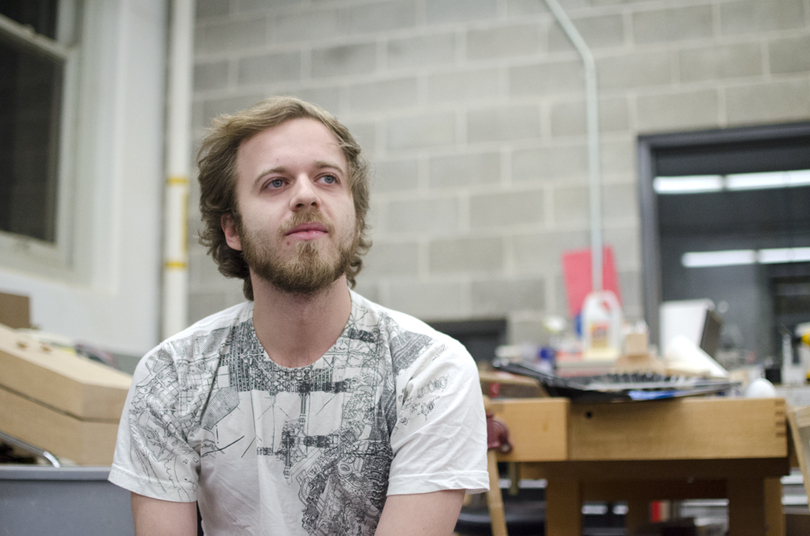Rooting for business: T-shirt start up partners with local stores to boost sales
Local businesses in Syracuse are finding another way to promote their companies: by putting them on T-shirts.
Root Goods, a T-shirt company started in 2012, is using its artistic talents to help boost other businesses in Syracuse.
The company, founded by Dan Mabie and Travis Adenau, two Syracuse University students, has previously partnered with Voltage Video Games in downtown Syracuse, and, most recently, Café Kubal’s University Avenue location.
The partnership began when Rob Petrie, an architecture professor, recommended Mabie, a senior architecture student, to Matt Godard, Café Kubal’s owner.
Mabie reached out to Petrie with an interest in connecting with local businesses, creating a mutually beneficial relationship by promoting a business with its T-shirts, and vice versa.
“If Root Goods can provide a better product that’s local and keep the money local and invest the money bigger, it’s kind of like Kickstarter 1.0,” he said. “Everybody pitches in on a root level instead of a global level.”
Petrie said there is a community within Syracuse businesses, one that is trying to support each other and build one another up.
Godard said the T-shirt was part of an effort to be more creative with Café Kubal’s products, which started in Syracuse. He added that his company ordered about 100 T-shirts, with 30 to 40 shirts that have already been sold.
The design is an artistic rendition of Café Kubal’s items, including its coffees, teas, espressos and lattes, painted in a watercolor style. The planning process began in September, with Café Kubal rolling out the final product by December.
“We’re just very supportive of startups in Syracuse of any sort,” Godard said. “We’ve done various things to try to promote other businesses through our business.”
He added that he plans on ordering more shirts and requesting more designs from Root Goods in the future, once the weather becomes warmer.
Back in August, Root Goods partnered with Voltage Video Games, a new and used gaming business in downtown Syracuse. The store was Root Goods’ first client, said Mike Saltzman, the business’s manager. The two were speaking when Adenau mentioned he had a clothing company.
Adenau and Mabie immediately started working on a shirt for Voltage Games, eager to partner with a local business. For Voltage Games, Saltzman said it allowed his store to benefit a community effort while at the same time helping his own store.
“One of the things we pride ourselves on is being able to work with the community and having handmade, locally-made items at our store,” he said. “It makes us proud to say, ‘hey we have these T-shirts, not only are they made for our store, but they’re made in Syracuse.’”
Saltzman added that he was impressed by the amount of effort both Mabie and Adenau put into their craft. He said he had very high demands for the product, and Root Goods was able to deliver.
Adenau and Mabie said they prefer to work with companies because it challenges them and also encourages creativity within the designs. Mabie said he hopes Root Goods can continue working with local businesses to create a community where entrepreneurs can support one another.
He added that one of the main reasons he wanted to make shirts for Voltage Video Games and Café Kubal was because he and Adenau both enjoy video games and coffee.
“We’re just looking for people who are passionate about what they do,” Adenau said. “Hopefully we can put some of our passion for graphics into that.”
Using a $2,000 inkjet printer, Root Goods is able to produce shirts using a process Adenau and Mabie described as “a fancy iron-on.”
While most iron-on shirts usually have a sticker-like appearance, Root Goods’ designs are made in a way that it appears to bleed onto the shirts. The team of two just recently bought the printer and spent more than 20 hours working on it initially, just to have it print in color.
Petrie, the architecture professor that recommended Root Goods to Café Kubal, said the process itself was one of the more interesting parts of the T-shirt company.
“That’s what’s fascinating about what he’s doing. He’s pushing what you would expect from a T-shirt manufacturer right out of his apartment,” he said. “He’s able to start with the tools that he has and make something out of it, other than printing essays or homework assignments.”
Adenau said the company holds a really high standard for the quality of its shirts, making its iron-on process much more intricate than usual.
“It’s in our best interest to have the final product to represent our vision in the best way possible,” he added.
Much like the printing, much of the company’s process has been a lot of trial and error, the two said. Although the company was difficult to balance with their life as college students when it started, the two have become experienced and accustomed to the workload, both as entrepreneurs and students.
Currently, the company is only gaining business through its Etsy shop, its Facebook page and reaching out to other businesses for specifically designed T-shirts.
Mabie added that he hopes to continue partnering with other local businesses, because it’s the best way to improve his own company.
Said Mabie: “I think that’s a good way for us to have solid and consistent growth that’s not just based on constantly reaching new people.”
Published on January 27, 2014 at 10:04 pm
Contact Alfred: alng@syr.edu
@alfredwkng







